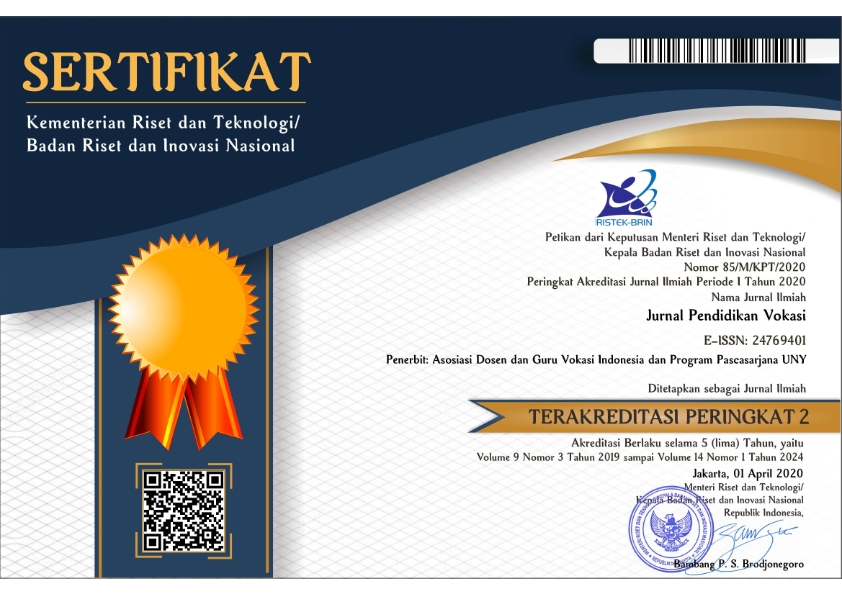Pengaruh cooperative project-based learning terhadap motivasi dan hasil belajar praktik “perbaikan motor otomotif” di SMKN 1 Seyegan
Wardan Suyanto, Universitas Negeri Yogyakarta, Indonesia
Abstract
Penelitian ini bertujuan untuk mengetahui pengaruh penerapan cooperative project-based learning terhadap motivasi dan hasil belajar siswa pada praktik ”Menentukan dan memperbaiki gangguan pada sistem kerja mesin”. Penelitian ini menggunakan pendekatan quasi-experiment dengan desain non equivalent control group. Populasi dalam penelitian ini adalah siswa kelas XII Teknik Kendaraan Ringan SMKN 1 Seyegan Tahun 2013/2014. Sampel penelitian dipilih melalui intact group, terdiri atas kelas XII TKR3 yang diberi perlakuan cooperative project-based learning sebagai kelas eksperimen dan kelas XII TKR2 yang diterapkan pembelajaran langsung sebagai kelas kontrol. Data dikumpulkan menggunakan angket, observasi, tes praktik, dan dokumentasi, kemudian dianalisis menggunakan uji t sampel bebas dan analisis kovarian (ANAKOVA). Hasil penelitian ini menunjukkan bahwa motivasi maupun hasil belajar siswa yang mengikuti cooperative projectbased learning lebih baik dibandingkan siswa yang mengikuti pembelajaran langsung seperti yang dilaksanakan selama ini.
THE EFFECTS OF COOPERATIVE PROJECT-BASED LEARNING ON LEARNING MOTIVATION AND ACHIEVEMENT IN PRACTICE ”AUTOMOTIVE MOTOR ” IN SMKN 1 SEYEGAN
Abstract
This study aims to investigate the effect of cooperative project-based learning implementation on student`s learning motivation and achievement in practice ”Determining and solving problems of engine working systems”. This research using a quasi-experiment method with equivalent control group design. The population of this research consists of year XII students of TKR major in SMK N 1 Seyegan in the 2013/2014 academic year. A sample was established using intact group which consists of XII TKR 2 class were taught using cooperative project-based learning strategy as experimental group and XII TKR 3 class were taught using direct instruction strategy as control group. The data were collected through questionnaire, observation, performance test and documentation then were analyzed using the independent sample t test and analysis of covariance (ANCOVA). This study concluded that students who follow the cooperative project-based learning are more motivated and achieve better learning outcomes than the other class who follow the direct instruction strategy.
Keywords
Full Text:
PDFReferences
Abdul, K. (2012). Algoritma dan pemrograman menggunakan Java. Yogyakarta: Andi Offset.
Ahmed, et.al. (2008). Blended e-learning design: Discussion of cultural issues. Journal of Cyber Society and Education.
Antonius, R.C. (2010). Algoritma dan pemrograman dengan bahasa C. Yogyakarta: Andi Offset.
Barbara, S., et al. (2008). Vienna E-Lecturing (VEL): Learning how to learn self-regulated in an internet-based blended learning setting. International Journal on E-Learning.
Bishop, G. (1989). Alternative Strategies for Education, London, McMillan Publisher Ltd, dalam Menyemai benih teknologi pendidikan, Yusufhadi Miarso, Kencana, Jakarta.
Dagdilelis, V., Satratzemi, M., and Evangelidis, G. (2004). Introducing secondary education student to algorithms and. Education and Information Technologies, 9(2).
Dankel, Muijs. (2004). Doing Quantitative Research in Education. British Library.
Direktorat Jenderal Pendidikan Tinggi. (2008). Pengembangan Kurikulum Berbasis Kompetensi Pendidikan Tinggi.
Driscoll, M., & Carliner, S. (2005). Advanced Web-based training strategies: Unlocking Instructionally sound online learning. San Francisco: John Wiley & Sons, Inc.
Fenton, D. & Watkins, B. W. (2010). Fluency in distance learning. Charlotte, NC: Information Age Publishing, Inc.
Fyans, Leslie J., & Jr., Martin L. Maehr. (1990). School Culture, Student Ethnicity, and Motivation ED327 947. Urbana, Illinois: The National Center for School Leadership.
Graham, C. R. (2006). Blended learning systems: Definition, current trends, and future directions. Dalam C. J. Bonk & C. R. Graham (Eds), The Handbook of Blended Learning: Global perspectives, local designs (pp. 3-21). San Francisco, CA: John Wiley & Sons, Inc.
Hadjerrouit, S. (2007). A Blended learning model in Java programming: A design-based research approach. Proceeding of the 2007 computer science and IT education conference.
Hadjerrouit, S. (2008). Towards a Blended Learning Model for Teaching and Learning Computer Programming: A Case Study, Journal of Informatics in Education.
Hamzah B. Uno. (2013). Teori motivasi dan pengukurannya. Jakarta: Bumi Aksara.
Harlen, W. and Crick, R.D. (2003). Testing and motivation for learning. Assessment in Education.
Heinze, A. (2008). Blended learning: An interpretive action research study. Disertasi doktor, tidak diterbitkan, University of Salford, Salford, UK.
Heinze, A. & Procter. (2006). Online communication and information technology education. Journal of Information Technology Education.
Jere, Brophy (2004). Motivating Students to Learn. Taylor & Francis.
Kaye & Thorne. (2003). Blended learning: How to integrate online and traditional learning. Kogan Page Limited.
Margolis, H., & McCabe, P. (2004). Self-efficacy: A key to improving the motivation of struggling learners. The Clearing House, 77.
Moh, Sjukani. (2004). Algoritma & Struktur Data dengan C, C++, dan Java. Jakarta: Mitra Wacana Media.
Moh. Usman, U. (2002). Menjadi guru profesional. Bandung: PT. Remaja Rosdakarya.
Mortera-Gutierrez, F. (2005). Faculty best practices using blended learning in e-learning and face-to-face instruction. 20th Annual Conference on Distance Teaching and Learning.
Nana, S. (2010). Evaluasi proses dan hasil pembelajaran. Jakarta: Bumi Aksara.
Patron, H., & Lopez, S. (2011). Student effort, consistency, and online performance. The Journal of Educator Online.
Prawiradilaga, Dewi Salma. (2007). Prinsip desain pembelajaran: Instructional Design Principles. Jakarta: Kencana.
Purwanto. (2013). Evaluasi hasil belajar. Yogyakarta: Pustaka Belajar.
Ruiz, J.G., Mintzer, M.J. and Leipzig, R.M. (2006). The Impact of E-Learning in Medical Education. Academic Medicine, 81(3).
Rusman, Deni, K., & Cepi, R. (2012). Pembelajaran berbasis Teknologi Informasi dan Komunikasi. Jakarta: Kharisma Putra Utama Offset.
Santrock, J.W. (2007). Educational Psychology. New York: McGraw-Hill.
Schunk, D.H., Pintrich, P.R., & Meece, J.L. (2012). Motivation in Education: Theory, Research, and Application. Third Edition, Pearson Education, Upper Saddle River, New Jersey.
Slemer, S. (2005). Use blended learning to increase learner engagement and reduce training cost.
Seok, S. (2008). Teaching aspect on e-learning. International Journal on E-Learning.
Sharpe, Rhona et.al. (2006). The undergraduate experience of blended e-learning: A review of UK literature and practice.
Susilana, R. & Riyana. (2009). Media pembelajaran: Hakikat, pengembangan, pemanfaatan, dan penilaian. Bandung: Wacana Prima.
Sutratinah, & Tirtonegoro. (2001). Penelitian Hasil Belajar Mengajar. Surabaya: Usaha Nasional.
Tam, M. (2000). Constructivism, instructional design, and technology: Implication for transforming distance learning. Education Technology, Volume 3 number 2.
Team Schoology. (2013). Schoology instructor guide. Lake Mills High School.
Thorne, K. (2003). Blended learning: How to integrate online and traditional learning. London: Kogan Page.
Walberg, H.J. & Tsai, S.L. (1983). Matthew effects in education. American Educational Research Journal, 20(3).
Wayne, H. & Ruth, D.C. (2003) Testing and Motivation for Learning, Graduate School of Education, Assessment in Education, Journal Assessment in Education.
Winataputra. (2008). Teori belajar dan pembelajaran. Universitas Terbuka, Jakarta.
Winkel, W.S. (1999). Psikologi pengajaran. Jakarta: PT. Grasindo.
Wowo, S.K. (2013). Filsafat
pendidikan teknologi vokasi dan kejuruan. Bandung: Alfabeta.
Xiaojing Liu, Xiaoying Wang & Rui Wang. (2013). Application of blended learning in data structures and algorithms course teaching. International Conference on Education Technology and Information System.
Zaenal, Abidin. Motivasi dalam strategi pembelajaran dengan pendekatan ARCS. Jurnal Fakultas Agama Islam Universitas Muhammadiyah Surakarta.
DOI: https://doi.org/10.21831/jpv.v5i1.6079
Refbacks
- There are currently no refbacks.

This work is licensed under a Creative Commons Attribution-ShareAlike 4.0 International License.
Our journal indexed by:















